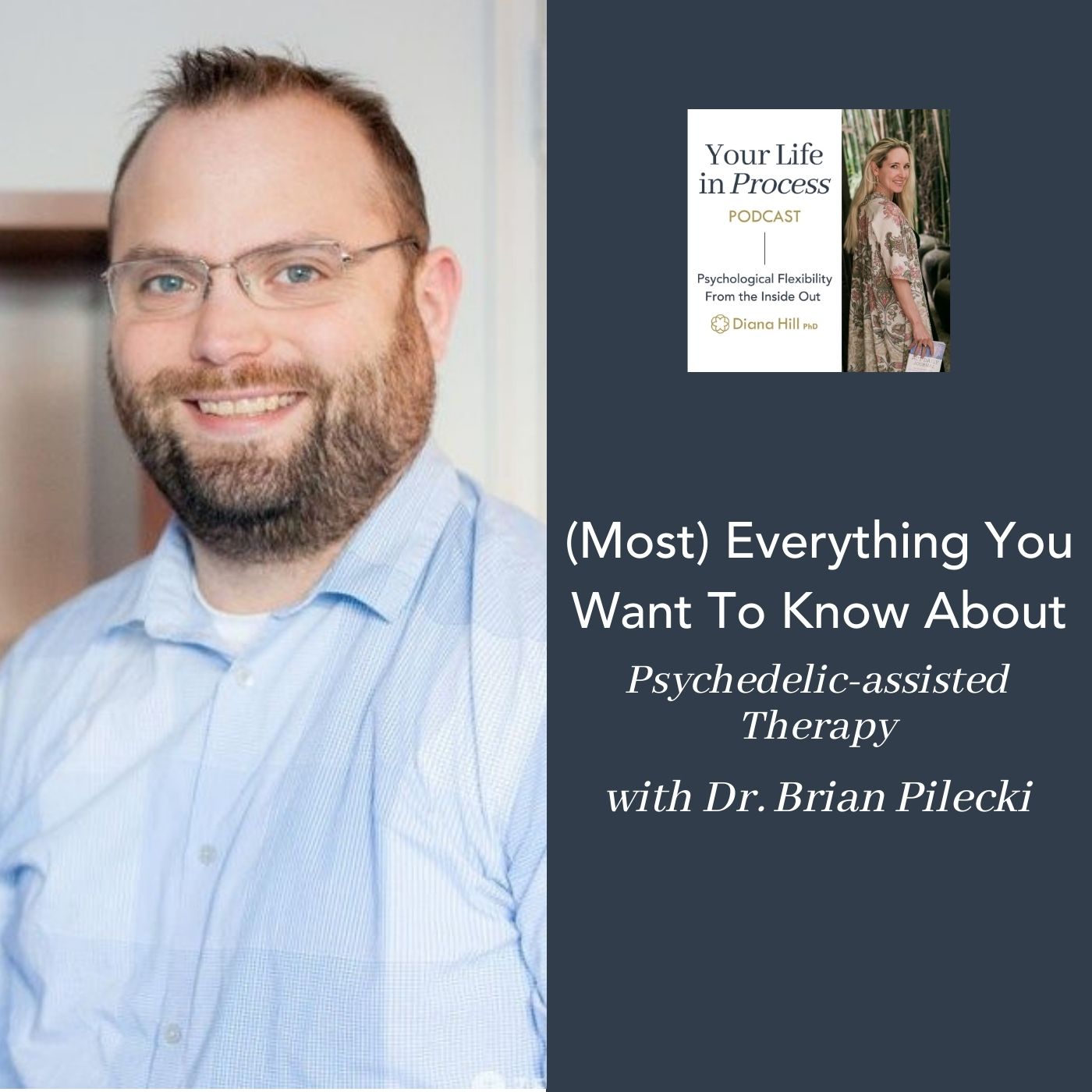There’s been growing recognition in mainstream Western culture that psychedelics have a role as potential tools in personal healing and mental health. Research studies investigating the use of psychedelics in mental health treatment have rapidly increased, and many of us have questions. What does the protocol for psychedelic-assisted therapy look like? What is the difference between psilocybin, MDMA, and ayahuasca? What are the risks and benefits of psychedelics as a treatment for anxiety, PTSD, and terminal illness? Today’s episode answers all of these questions and more!
About Dr. Brian Pilecki
Brian Pilecki, Ph.D.: Dr. Brian Pilecki is a clinical psychologist at Portland Psychotherapy that specializes in the treatment of anxiety disorders, trauma and PTSD, and psychedelic-assisted therapy. Brian practices from an orientation based in Acceptance and Commitment Therapy (ACT) and has extensive experience in the areas of mindfulness and meditation that he incorporates into therapy with clients. At Portland Psychotherapy, Brian is an active researcher and a study therapist on a clinical trial investigating the use of MDMA-assisted therapy for the treatment of social anxiety disorder and understanding processes of change in psychedelic therapy. He is a consultant and instructor for Fluence Training and co-chairperson for the Psychedelic Special Interest Group of the Association for Contextual Behavioral Science. He also co-hosts a podcast called Altered States of Context about the intersection of psychedelics and psychotherapy.
Key Takeaways
- Psychedelics have a lot of attention in the media right now, but the research on them dates back to the 50s and 60s
- The primary psychedelics being researched for mental health concerns are psilocybin, MDMA, and ketamine. These substances are mostly safe, but there are risk factors
- Many people are interested in psychedelic experiences for personal growth and healing, but the current legal situation around psychedelics makes this difficult to do safely and effectively.
- Psychedelic-assisted therapy is time intensive and involves more than just taking a substance. Integration sessions help clients maintain the impact of their psychedelic experience.
- Psychedelics may be acting in part by increasing psychological flexibility, making ACT a particularly good match for psychedelic-assisted therapy
- Research into psychedelics for anxiety and terminal illness is promising
- There are cultural concerns when researching psychedelics including cultural appropriation, high cost, and the need for more diversity in research studies
Related Resources
- Download Your Daily Practice for this episode
- Find out what kind of Striver you are and get your free Skillful Striving Toolkit
- Learn more about Psychedelic Assisted Therapy Here
- Learn More about Dr. Brian Pilecki
Diana’s Events
- Reserve your spot in Diana’s Reset and Restore Retreat in Costa Rica in 2023!
- Sign up for Diana’s From Striving to Thriving Summit!
- See Diana at an upcoming event
Connecting With Diana
Thank you for listening to Your Life in Process! Subscribe to the podcast for free on Apple Podcasts, Spotify, Google Podcasts. If you have any questions or feedback you can contact Diana by email podcast at yourlifeinprocess dot com or leave Diana an audio message at (805) 457-2776. Follow Diana at YouTube, Instagram, LinkedIn, Facebook, and Diana’s website.
Thank you to the team Craig, Angela Stubbs, Ashley Hiatt, and Abby Diehl. Thank you to Benjamin Gould of Bell & Branch for your beautiful music.
Remember when you become psychologically flexible, you become free.
Episode Segments
- [00:00] Introduction
- [00:45] About Dr. Brian Pilecki
- [01:25] Dr. Brian Pilecki’s Path To Psychedelics
- [03:53] What Are Some Of The Different Psychedelics?
- [06:07] What Is Happening In The Brain With Psychedelics
- [08:52] What Is Psychedelic-assisted Therapy?
- [10:25] What Do Psychedelic-assisted Therapy Sessions Look Like?
- [13:06] The History of Psychedelic Research
- [15:10] The Utility Of Psychedelics For Human Suffering
- [19:42] The Parallel Between Meditation and Psychedelics
- [22:03] Why ACT Is A Good Match For Psychedelics
- [25:25] Common Fears About Psychedelics And Risk Factors
- [30:57] What Are The Options For Psychedelics Now?
- [33:09] What Frequency Is Recommended For Psychedelic Use?
- [39:04] What About Ayahuasca?
- [41:18] The Research On Social Anxiety and MDMA
- [44:04] Cultural Issues In Psychedelic Therapy
- [45:08] The Cost Of Psychedelic-assisted Therapy
- [50:00] Brian Pilecki’s Resources
- [51:38] Your Daily Practice
- [53:34] Connect With The Podcast

+ show comments
- Hide Comments
add a comment